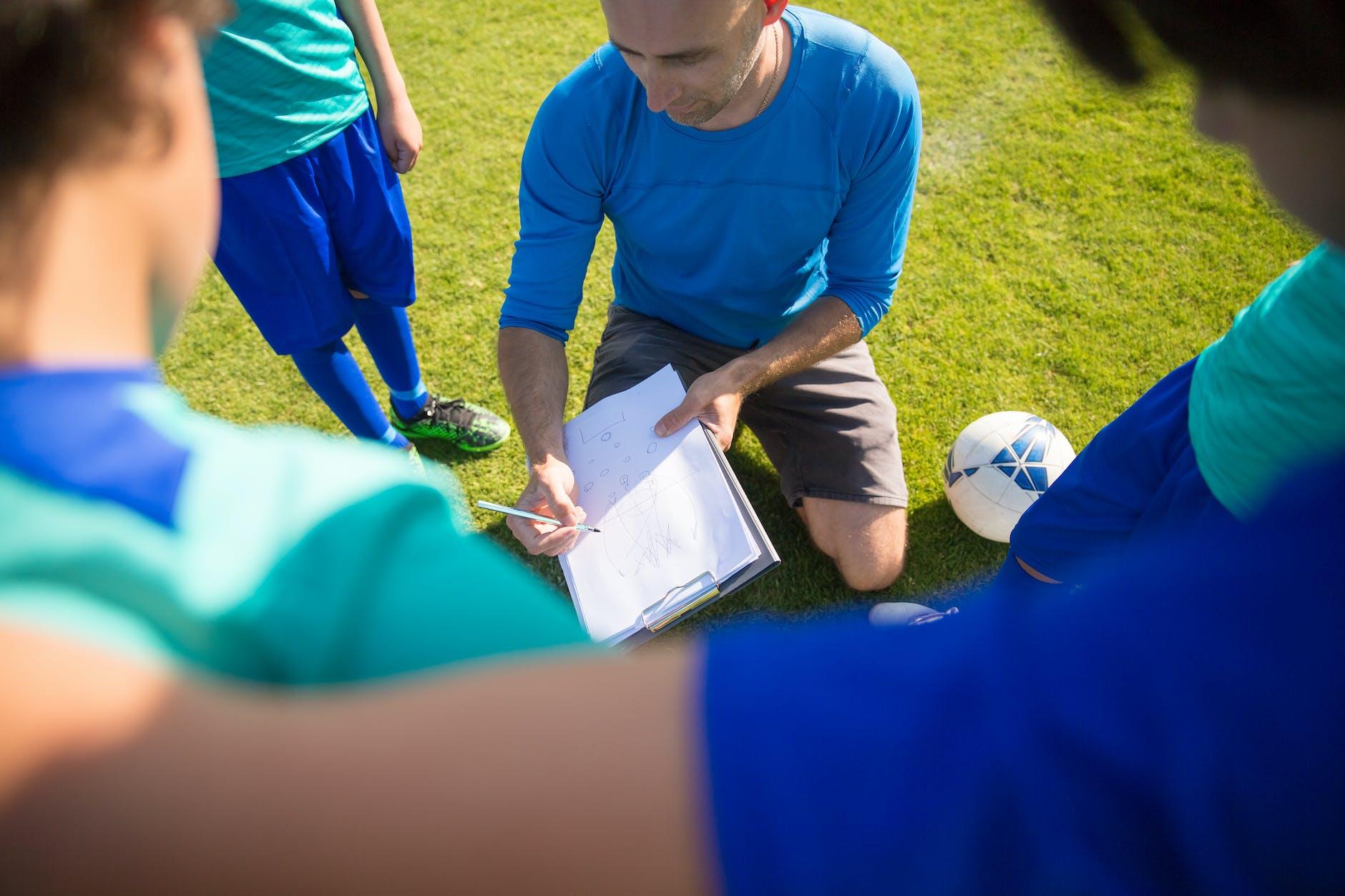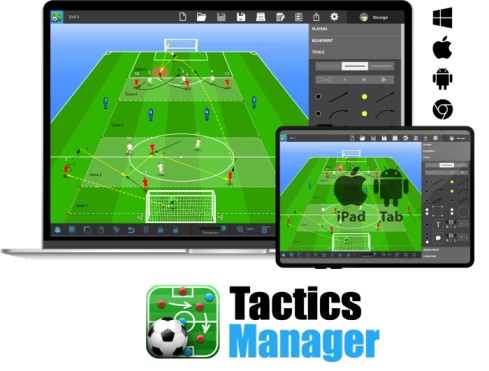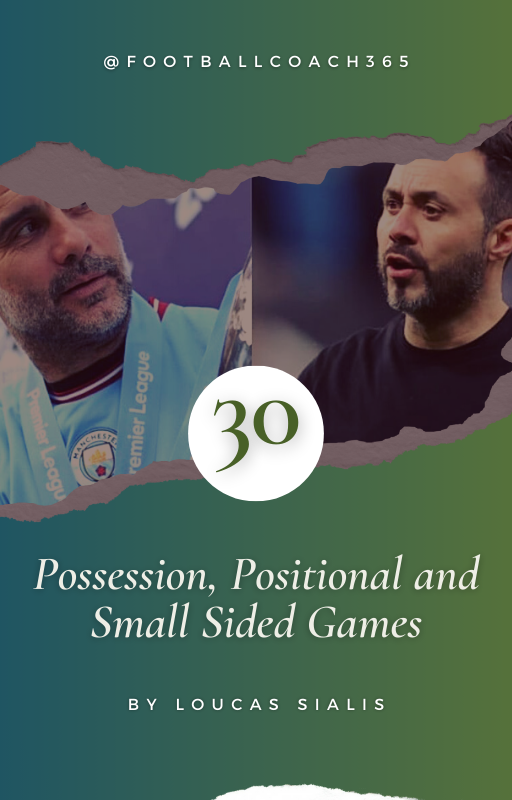As any football coach knows, designing effective football session plans is much more than just organizing a few football drills. It’s a dynamic process that requires careful planning, an understanding of your players’ needs, and the ability to adapt on the fly.
Preparing proper football session plans is essential for player development and team success, but creating them comes with its own set of challenges. Whether you’re working with a professional team or a group of passionate amateurs, the ability to overcome these challenges is key to maximizing performance and keeping players motivated.
In this article, we’ll explore the common challenges coaches face when preparing the weekly football session plans and how to overcome them to ensure that each training day is both productive and engaging.
Table of Contents

Elevate Your Coaching Journey
Are you ready to take your coaching career to the next level? Look no further than FootballCoach365, your ultimate destination for top-notch coaching material.
Join the Coach’s Corner today and experience the transformative power of proper planning, training and coaching.
Understanding the Team’s Needs
One of the most critical aspects of the designing of football session plans is understanding the specific needs of your team. Every team is different, and each player has unique strengths and weaknesses. A good soccer coach must assess these factors regularly to create effective training sessions.
Before a session begins, a coach needs to have a clear understanding of the skill level of each player.
Are they technically proficient?
How do they perform under pressure?
Knowing where your players excel or struggle allows you to design drills that challenge them without being overly complex or discouraging.
Each session should have clear goals, both for individual players and the team as a whole. Is the focus on improving ball control, tactical awareness, or defensive organization? Tailoring sessions to address specific objectives ensures that players understand the purpose of each drill and can track their own progress.
Weaknesses are not just technical but can also be mental or physical. Some players might struggle with positioning, while others may need to build stamina.
Football session plans should focus on improving these areas without neglecting a player’s strengths, ensuring a balanced approach.
Time Management and Scheduling
Coaches often face the challenge of fitting numerous responsibilities into a limited time frame. Efficient time management is essential for balancing training, individual player development, analysis, and media commitments.
To tackle this, many coaches are opting to “outsource” the design of drills and session plans for specific training days. This allows them to concentrate on tactical preparations for upcoming matches.
On days focused on more general or individual fundamentals, managers may ask from coaches to take charge of designing and delivering sessions, freeing up time to analyze opponents, review data statistics, refine their game model, or assess past performances.

But what if a team is on a budget, and the head coach lacks a robust support staff? In such cases, an effective solution is to join a coaching community or seek an outsourcing service that aligns with your coaching philosophy. Building a professional relationship with these resources can provide tailored drills and session plans that cover general training topics.
By utilizing a “Training Methodology” service or subscribing to a Coaching newsletter, you gain instant access to a wealth of ideas, drills, session plans, and materials. This not only saves you the hassle of searching for resources but also allows you to focus on more critical tasks throughout the week.
In essence, these memberships and services offer coaches the luxury of time—time to strategize, analyze, and ultimately enhance their team’s performance.

Coaching software that enables you to create your own practices, tactics and plan sessions
- High Tempo Football
- Quick and easy to use – Create diagrams in minutes!
- Work offline – No Internet Connection needed!
- One-time only cost + Free Version updates for life!
- Use on Win, Mac & iPad, Android Tablet and Chromebook
Tactical vs Technical Focus
Finding the right balance between tactical training and technical skill development can be a challenge in daily football session plans. Both are essential for a well-rounded player.
For example, a training session might include drills to develop passing accuracy and close control, alongside exercises focused on team positioning and providing proper supporting. Knowing when to prioritize each depends on the team’s recent performance and upcoming opponents or on the coach’s game model.
A possession based game model will require more possession and positional games while a more defending style of play may need more phase of game drills or small sided games.
Overusing the same drills can lead to player boredom or uneven skill development. Coaches must rotate through a variety of drills to cover all aspects of the game, from shooting accuracy to defensive strategies.
While technical drills are necessary, match simulation games can be highly beneficial for applying learned techniques in a game-like environment. It allows players to practice decision-making under pressure, developing both individual and team tactical awareness.
Keeping Players Engaged
A disengaged player is unlikely to benefit fully from training. Coaches must find ways to keep sessions lively and mentally stimulating.
Monotony can kill a player’s motivation. By mixing up the types of drills – alternating between skill-based drills, small-sided games, and physical conditioning – coaches can ensure players remain mentally sharp and invested in their development.
Adding a competitive edge to drills, such as awarding points for completing tasks or making it a mini-tournament, can bring out the best in players. Gamification motivates players to push themselves harder while having fun.
Not all players learn in the same way. Some may be visual learners, while others need to practice repeatedly to grasp a concept.
A coach needs to adjust the delivery of instructions to accommodate various learning styles, using video analysis, demonstrations, and feedback.
30 Possession, Positional and Small Sided Games

Dive into the world of tactical mastery and player development with an expansive collection
- High Tempo Football
- Players develop their technical skills and tactical understanding
- Players cultivate essential life skills such as communication, leadership, and resilience.
- They learn to adapt to varying game situations
- Think critically under pressure, and collaborate effectively with teammates
- Forging bonds that extend beyond the final whistle.
Managing Physical Load and Injuries
Balancing physical workload while preventing injuries is one of the most difficult challenges in football training.
Training too hard without adequate rest can lead to fatigue and injury. Coaches must regularly monitor players’ physical conditions, adjusting sessions if players are showing signs of exhaustion or minor injuries.
Warm-up exercises are essential to prepare the body for intense activity, reducing the risk of injury. Similarly, cool-down exercises aid recovery and prevent soreness, allowing players to stay in top condition.
Overtraining is a real concern, particularly in a season packed with matches. Coaches need to strike a balance between pushing players to improve and giving them the rest they need.
Periodic rest days or lighter training sessions can help prevent injuries. The physical load of the players must be an important factor when preparing the week’s football session plans.
Using Technology and Data
The rise of technology has revolutionized how football coaches organize and evaluate a session plan. Recording training sessions and matches allows coaches to review performances and identify specific areas for improvement.
Using video and data analysis has become essential for maximizing player performance, providing visual feedback that often proves more impactful than verbal instructions alone.
Our perception of a game can be misleading. The human brain struggles to retain all the details, tactics, and moments—both good and bad—that unfold during a match. Emotions after a game, particularly following a loss, can cloud our judgment about the team’s overall performance.
That’s why objective analysis is crucial for gaining a clear understanding of what really happened on the pitch and where our team stands in relation to our performance goals.
To elevate team performance and prepare thoroughly for upcoming opponents, it’s vital to utilize analysis resources for both our games and those of our rivals.
If a club can’t afford to hire a full-time or part-time tactical or performance analyst, there are affordable alternatives available.
External analysis services, including team and opponent video breakdowns, advanced statistics, and scouting reports, offer objective insights that go beyond what’s visible during the game.
These resources help uncover patterns, weaknesses, and opportunities that might not be immediately noticeable, allowing coaches to make informed decisions and enhance their game strategy.
Motivational and Psychological Challenges
Football is as much a mental game as it is physical. Coaches must be aware of the mental state of their players to keep them motivated and focused.
A series of losses or poor individual performances can lead to frustration or low morale. Coaches need to inspire their team, focusing on long-term goals and celebrating small victories to maintain motivation. This is the way to build a winning team.

The most important quality a player can have is not skill, but mentality
Jose Mourinho
Mental fatigue can be just as detrimental as physical tiredness. Incorporating mental breaks, mindfulness exercises, or team-building activities into training can help keep players sharp and focused.
Coaches play a crucial role in developing leadership qualities and mental toughness. Through challenges, feedback, and responsibility, players can grow into leaders both on and off the field.
Dealing with Varying Age Groups and Experience Levels
Not all football teams are created equal, and a coach often has to work with players of different ages or experience levels, requiring session plans to be flexible.
- Adjusting Sessions for Youth vs Adult Teams: Youth players typically need more guidance and simple soccer drills, whereas adult teams can handle more complex tactical and technical training. Coaches need to adjust their approach based on the age group they are working with. As simple passing drill sometimes can offer more than a larger size game.
- Catering to Amateur vs Professional Athletes: Professional athletes require fine-tuning and maintenance, while amateur players may need to work on fundamental skills. Balancing these needs ensures that all players continue to develop at the appropriate pace.
- Grouping Players by Skill Level for Optimal Training: Coaches can maximize the effectiveness of training sessions by grouping players of similar skill levels. This allows for more targeted coaching and ensures that all players are both challenged and encouraged to improve. An example is to use more complex exercises than dribbling drills or 1 v 1’s, with an attacking facing a single defender can be used that will enhance the combination play and ball possession.
Building Team Cohesion
A well-functioning team is one that communicates effectively and works together toward a common goal. Coaches must focus on fostering this sense of unity.
Football session plans and drills that require communication, such as passing drills or tactical simulations, can improve a team’s cohesion. Encouraging players to talk on the field enhances their understanding of each other’s movements and improves overall teamwork.
Off-the-pitch activities like team bonding exercises can build trust and camaraderie among players. These activities help players develop strong relationships that can translate into better on-field chemistry.
Football teams are often a mix of personalities, and managing these dynamics is crucial. Coaches need to be aware of how social relationships within the team can affect performance, addressing any issues that might arise.
Coach’s Personal Development
Finally, a coach must never stop learning. Personal development and coach education is essential to staying relevant in the ever-evolving world of football.
Staying Updated with Modern Football Tactics
Football tactics are constantly evolving. Coaches must stay up-to-date with the latest trends, whether by watching professional matches, reading coaching books, or reviewing other coaches’ football session plans to enrich their own knowledge, but without copying them.
Attending Coaching Workshops and Seminars
Workshops and seminars provide valuable opportunities to learn from other experienced coaches and refine training methods. Networking with peers in the coaching community can also inspire new ideas and strategies.
Coaching and Mentorship
Having a football coaching mentorship is invaluable for a coach’s growth and development. A mentor provides guidance, shares experience, and offers insights that can help a coach refine their skills and enhance their understanding of the game.
This personalized support allows coaches to gain new perspectives on tactics, team management, and player development. Mentorship also provides a platform for continuous learning, helping coaches stay up to date with the latest strategies and innovations in football.
By having an experienced professional to turn to, coaches can avoid common mistakes, receive constructive feedback, and ultimately become more effective leaders, improving both their own performance and that of their teams. By analyzing their own performance, a coach can become more effective in preparing football session plans and leading their team to success.
Conclusion
Designing a daily football session plans involves balancing a variety of factors, from managing time and fatigue to addressing tactical and technical goals. By understanding the specific challenges involved, coaches can create an ideal coaching session that are engaging, productive, and tailored to the needs of their team.
There is not a magic coaching manual or a general session planner to help a coach preparing his training plans. The key to success lies in being adaptable, staying informed, and continuously refining the approach to session planning.
FAQs
- How do coaches balance technical and tactical training?
Coaches balance technical and tactical training by alternating between drills that focus on individual skills, like passing and shooting, and team-based exercises that emphasize positioning, strategy, and game-like situations.
- What are the most effective ways to prevent overtraining?
Effective ways to prevent overtraining include incorporating proper recovery periods, monitoring player fatigue, and using periodization to manage training intensity over time.
- How important is video analysis in modern football training?
Video analysis is incredibly important as it allows players to visually assess their performance, understand mistakes, and see areas for improvement, leading to more effective and targeted training sessions.
- How can a coach motivate players during a losing streak?
During a losing streak, a coach can motivate players by focusing on small improvements, maintaining a positive attitude, and reinforcing the team’s long-term goals rather than fixating on short-term setbacks.
- What is the best way to incorporate recovery in daily soccer training sessions?
Recovery can be incorporated through lower-intensity drills, ensuring proper warm-ups and cool-downs, and scheduling lighter training days after particularly intense sessions or matches.


[…] can monitor players’ performance metrics live during training sessions. This real-time insight allows for immediate adjustments, whether it’s pushing a player […]